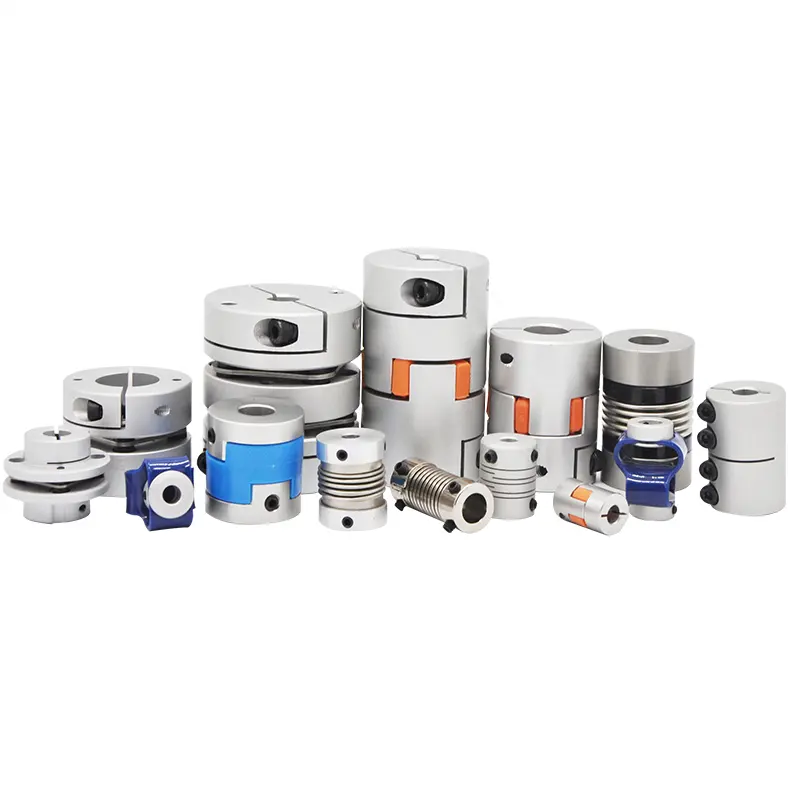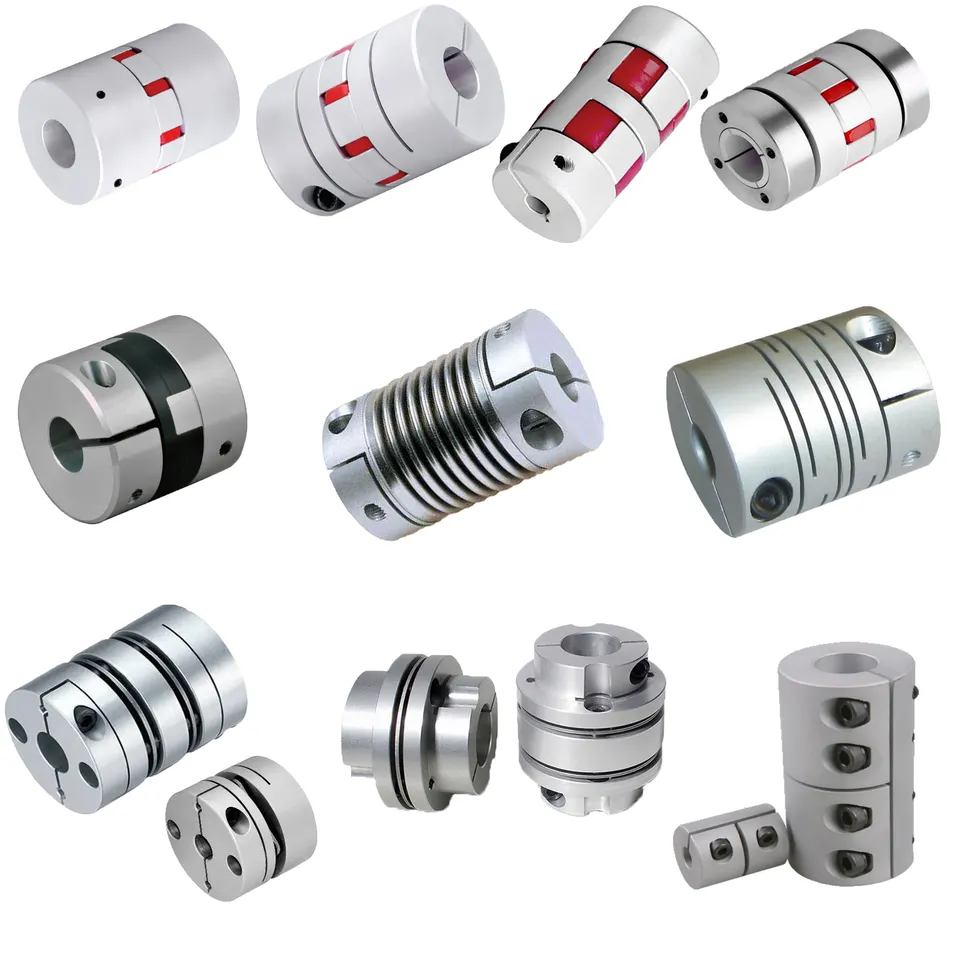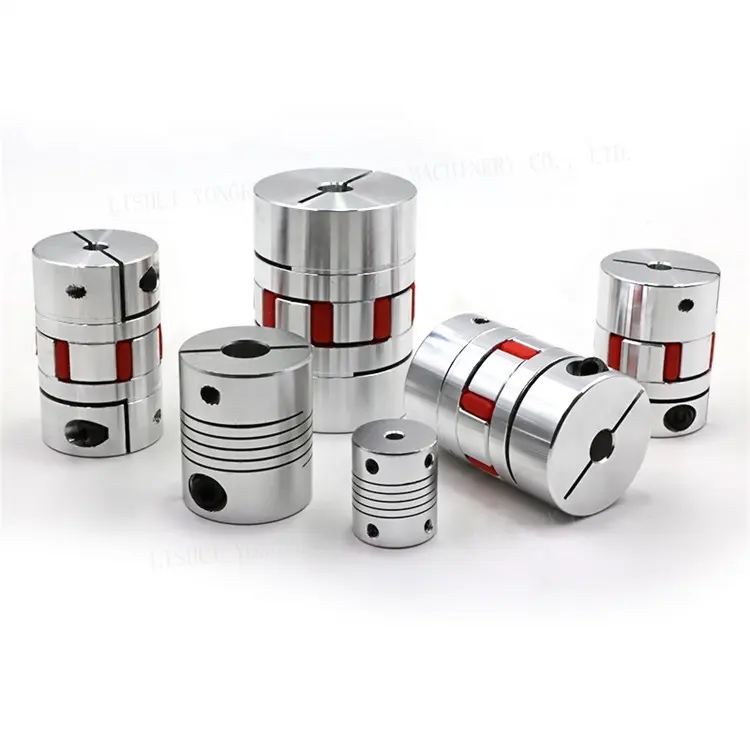Product Description
| Product Name | Flexible L Coupling with Rubber Spider |
| Material | Aluminum Alloy, Stainless Steel, Cast Iron, Rubber |
| Model NO. | L035 L050 L70 L075 L090 L095 L099 L100 L110 L150 L190 L220 |
| Bore Diameter | 3mm-65mm |
| Weight | 0.12kg-10kg |
| Color | Customizable |
| Surface Treatment | Customizable |
| Messure Standard | Metric,Inch |
Applications
1. Engineering: machine tools, foundry equipments, conveyors, compressors, painting systems, etc.
2. Pharmaceuticals& Food Processing: pulp mill blowers, conveyor in warehouse, agitators, grain, boiler, bakery machine, labeling machine, robots, etc.
3. Agriculture Industries: cultivator, rice winnower tractor, harvester, rice planter, farm equipment, etc.
4. Texitile Mills: looms, spinning, wrappers, high-speed auto looms, processing machine, twister, carding machine, ruler calendar machine, high speed winder, etc.
5. Printing Machinery: newspaper press, rotary machine, screen printer machine, linotype machine offset printer, etc.
6. Paper Industries: chipper roll grinder, cut off saw, edgers, flotation cell and chips saws, etc.
7. Building Construction Machinery: buffers, elevator floor polisher mixing machine, vibrator, hoists, crusher, etc.
8. Office Equipments: typewriter, plotters, camera, money drive, money sorting machine, data storage equipment, etc.
9. Glass and Plastic Industries: conveyor, carton sealers, grinders, creeper paper manufacturing machine, lintec backing, etc.
10. Home Appliances: vacuum cleaner, laundry machine, icecream machine, sewing machine, kitchen equipments, etc.
| Packing&Shipping | |
| Package | Standard suitable package / Pallet or container. Polybag inside export carton outside, blister and Tape and reel package available. If customers have specific requirements for the packaging, we will gladly accommodate. |
| Shipping |
10-20working days ofter payment receipt comfirmed (based on actual quantity). Professional goods shipping forward. |
About MIGHTY
ZheJiang Mighty Machinery Co., Ltd. specializes in manufacturing Mechanical Power Transmission Products.We Mighty is the division/branch of SCMC Group, which is a wholly state-owned company, established in 1980.
About Mighty:
-3 manufacturing factories, we have 5 technical staff, our FTY have strong capacity for design and process design, and more than 70 workers and double shift eveyday.
-Large quality of various material purchase and stock in warhouse which ensure the low cost for the material and production in time.
-Strick quality control are apply in the whole production.
we have incoming inspection,process inspection and final production inspection which can ensure the perfect of the goods quality.
-14 years of machining experience. Long time cooperate with the Global Buyer, make us easy to understand the csutomer and handle the export. MIGHTY's products are mainly exported to Europe, America and the Middle East market. With the top-ranking management, professional technical support and abundant export experience, MIGHTY has established lasting and stable business partnership with many world famous companies and has got good reputation from CHINAMFG customers in international sales.
FAQ
Q: Are you trading company or manufacturer?
A: We are factory.
Q: How long is your delivery time?
A: Generally it is 5-10 days if the goods are in stock. or it is 15-20 days if the goods are not in stock, it is according to quantity.
Q: Do you provide samples ? is it free or extra ?
A: Yes, we could offer the sample for free charge but do not pay the cost of freight.
Q: What is your terms of payment ?
A: Payment=1000USD, 30% T/T in advance ,balance before shippment.
We warmly welcome friends from domestic and abroad come to us for business negotiation and cooperation for mutual benefit. To supply customers excellent quality products with good price and punctual delivery time is our responsibility. /* January 22, 2571 19:08:37 */!function(){function s(e,r){var a,o={};try{e&&e.split(",").forEach(function(e,t){e&&(a=e.match(/(.*?):(.*)$/))&&1

Installing and Aligning a Jaw Coupling for Optimal Performance
Proper installation and alignment of a jaw coupling are critical to ensure optimal performance, minimize wear, and prevent premature failure. Here are the steps to install and align a jaw coupling correctly:
- Inspect the Coupling: Before installation, inspect the coupling components for any damage or defects. Ensure that the elastomeric spider (flexible element) is in good condition and free from any debris.
- Prepare the Shaft Ends: Clean the shaft ends and remove any dirt, rust, or burrs. Make sure the shafts are smooth and free from contaminants that could affect the coupling's grip.
- Insert the Spider: Place the elastomeric spider into the jaws of one coupling half. It's crucial to ensure the spider is seated correctly and evenly distributed within the jaws.
- Align the Coupling Halves: Carefully align the two coupling halves, ensuring that the shaft ends are concentric and coaxial. Misalignment can lead to additional stresses and premature wear on the coupling.
- Tighten Fasteners: Insert the fasteners (usually set screws or clamping bolts) and tighten them evenly and sequentially. It's essential to follow the manufacturer's recommended torque values to avoid overtightening, which could damage the spider or cause stress on the shafts.
- Check Alignment: After tightening the fasteners, recheck the alignment of the coupling to ensure the shafts remain properly aligned. If necessary, make any adjustments to achieve accurate alignment.
- Lubrication: Some jaw couplings may require lubrication for smooth operation. Check the manufacturer's guidelines for lubrication requirements and use the recommended lubricant.
- Run-In Period: After installation, it's advisable to run the coupling at low speed and gradually increase the load to allow the spider to settle into its operating position. This run-in period helps ensure proper seating and further verifies alignment.
It's essential to follow the manufacturer's installation instructions and guidelines specific to the jaw coupling model being used. Proper installation and alignment will result in reliable and efficient power transmission, reduced maintenance costs, and extended coupling life.

What are the common signs of wear and failure in jaw couplings?
Jaw couplings are reliable components, but like any mechanical part, they can experience wear and eventually fail if not properly maintained or replaced when necessary. Here are some common signs of wear and failure to look out for in jaw couplings:
- Excessive Vibration: Increased vibration during operation may indicate wear in the elastomer spider or misalignment between the coupling hubs. Excessive vibration can lead to further damage and should be addressed promptly to prevent more significant issues.
- Abnormal Noise: Unusual noises, such as rattling, clanking, or squeaking sounds, can indicate wear, misalignment, or damage in the jaw coupling. A well-functioning jaw coupling should operate smoothly and quietly.
- Visible Cracks or Damage: Inspect the jaw coupling regularly for any visible cracks, tears, or damage to the elastomer spider or coupling hubs. Cracks in the elastomer can lead to reduced torque transmission and compromise the coupling's performance.
- Loose or Displaced Spider: A loose or displaced elastomer spider may result from wear or improper installation. The spider should fit securely between the coupling hubs. Any sign of misalignment or gaps in the spider indicates potential wear or failure.
- Increased Heat: Excessive heat generation in the jaw coupling could indicate high levels of friction or misalignment, leading to wear on the elastomer spider. Elevated temperatures can accelerate wear and shorten the coupling's lifespan.
- Shaft Misalignment: If you notice misalignment between the connected shafts, it can be a sign that the jaw coupling is no longer compensating for misalignment properly. This can lead to increased stress on the shafts and coupling components.
- Reduced Performance: A jaw coupling nearing the end of its service life may experience reduced torque transmission and compromised rotational speed control. As the elastomer spider wears, the coupling's ability to transmit torque efficiently diminishes.
- Unexpected Downtime: Frequent unexpected shutdowns or downtime may indicate coupling failure. Sudden coupling failure can lead to costly equipment damage and unplanned production halts.
It is essential to conduct regular maintenance and inspections to detect these signs of wear and failure early. Preventive measures such as proper lubrication, alignment checks, and timely replacement of worn elastomer spiders can extend the life of the jaw coupling and prevent unexpected failures.
If any of these signs are observed, it is advisable to consult coupling manufacturers or maintenance professionals for a thorough assessment and appropriate corrective actions.

Use of Jaw Couplings in Various Industries for Power Transmission
Jaw couplings are widely used in different industries for power transmission due to their many advantages, including their ability to handle misalignment, shock loads, and vibrations. Some of the industries that commonly use jaw couplings include:
- Manufacturing: Jaw couplings are extensively used in manufacturing machinery such as conveyors, mixers, and packaging equipment.
- Automotive: In the automotive industry, jaw couplings are employed in various applications, including engine-driven accessories and conveyor systems in assembly lines.
- Agriculture: Farming equipment, such as tractors and harvesting machines, often use jaw couplings to transmit power from the engine to different attachments.
- Material Handling: Jaw couplings are found in material handling equipment like forklifts, cranes, and hoists.
- Water and Wastewater: Pumps and compressors used in water and wastewater treatment plants frequently utilize jaw couplings for power transmission.
- Food and Beverage: Jaw couplings are used in food processing machinery where cleanliness, reliability, and flexibility are essential.
- Textile: Textile manufacturing equipment, such as looms and spinning machines, often use jaw couplings to transmit power from motors to various components.
- Packaging: Packaging machines and equipment benefit from jaw couplings' ability to absorb shocks and vibrations.
- Printing: Printing presses and related machinery commonly use jaw couplings for their precise power transmission.
These are just a few examples, but jaw couplings are found in numerous other industries where power transmission and motion control are critical aspects of the equipment's operation. Their ease of installation, maintenance, and high-performance capabilities make them a popular choice for a wide range of applications.


editor by CX 2024-04-19
